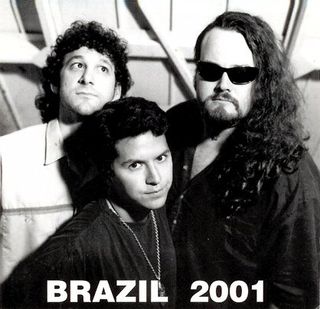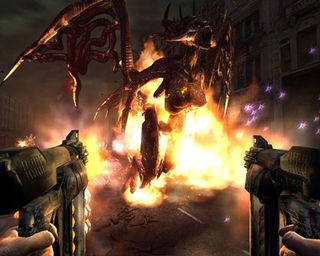Before the year 2007, Bill Roper was beloved by PC gamers, due to his work on Warcraft, Diablo and StarCraft. Then in 2003 Roper left Blizzard to co-found Flagship Studios, and began working on Hellgate: London. When Hellgate was released, the high hopes of many PC gamers were crushed, and Roper went from beloved to reviled.
Until recently Roper was the Executive Producer of Cryptic Studios’ MMO Champions Online. He took a break from fielding job offers to answer a few questions.

How did you get into the games industry?
Back in 1994 I was working at a photocopying store, doing desktop publishing. I had a good friend who was an artist at Blizzard, and they were looking for somebody to do the music for the PC version of Blackthorne. I also did some voiceover work for a demo reel they were taking to that summer’s Consumer Electronics Show (CES). I also helped to write the script for the first Warcraft – sitting with Blizzard’s sound guy in his tiny closet office and coming up with all those original ideas for the universe.
Back then Blizzard was very much a meritocracy, so if you were able to show that you had the ability to do something then you were given the chance to give it a try. Which shows how very different the industry was at that time. I quickly went from this guy that came in to do funny voices and bits of music to the one who created the backstory for the Warcraft universe!

Above: Bill has also been a thespian... or a LARPer?
How do you direct and manage a large creative team?
Things work very differently for every team that you work with. I find that most theories of management tend to be about understanding what works naturally in a team that has excellent communication and the ability to look towards a common goal. Keep lists of things. Get a box of Bud! As a manager there is no substitute for wandering around the team and just saying: “How’s it going? What are you working on?”
Blizzard grew rapidly through the ’90s. How did gaming change then?
Through the ’90s the PC started to become less expensive and more popular, infiltrating the home, so we started recognising that there was an opportunity. And the area that we were able to latch onto was that there was a connectivity with PCs that simply didn’t exist on consoles. This was always a major focus for Blizzard: “How do we use this connectivity?”
That whole concept of playing with someone else from anywhere in the world was revolutionary at the time that Battle.net launched. It was very forward-thinking.

Above: Or perhaps, Rock God?
Were there any particular ‘Oh my God!’ moments?
Yeah, I remember when we shipped the original Warcraft. At one point they upped the order to 125,000 for the initial shipping total. And that was just insane back then – it was a crazy number. We started to think: “Wow! Maybe this is gonna work.”
Then Warcraft II just took off in a way that no-one expected. I mean, we did it in about 11 months. And I think if you looked back and played the game now it would seem very short compared to what today’s players expect from their PC games.
Just looking at the amount of traffic around Battle.net when Diablo and StarCraft first launched was a huge indicator that we were doing things right and that we were tapping into something that was in the process of exploding.

Above: Oh. Definitely LARPer
Fast-forwarding to the last few years, you’ve had your own ups and downs with Hellgate: London.
Hellgate: London was very much a roller coaster ride. I was fortunate enough to be able to start up my own company with a talented bunch of individuals. And I think that maybe the thing that was the most difficult for us to overcome was that there was such an amazingly high degree of expectation from our company and from that game.

Above: Hellgate: London sure looked awesome
We raised the expectations for the game to unobtainable heights. By the time Hellgate launched the expectation was that it was going to change the face of PC gaming. Fans and reviewers were actually saying that!
